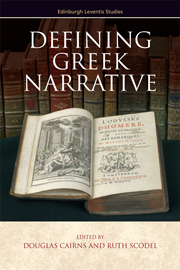Book contents
- Frontmatter
- Contents
- Preface
- Notes on Contributors
- 1 Introduction
- PART I DEFINING THE GREEK TRADITION
- PART II THE DEVELOPMENT OF THE GREEK TRADITION
- 6 Exemplarity and Narrative in the Greek Tradition
- 7 ‘Where do I begin?’: An Odyssean Narrative Strategy and its Afterlife
- 8 Some Ancient Views on Narrative, its Structure and Working
- 9 Who, Sappho?
- 10 The Creative Impact of the Occasion: Pindar's Songs for the Emmenids and Horace's Odes 1.12 and 4.2
- 11 Narrative on the Greek Tragic Stage
- 12 Stock Situations, Topoi and the Greekness of Greek Historiography
- 13 Heliodorus the Hellene
- PART III BEYOND GREECE
- Bibliography
- Index
6 - Exemplarity and Narrative in the Greek Tradition
from PART II - THE DEVELOPMENT OF THE GREEK TRADITION
Published online by Cambridge University Press: 05 September 2014
- Frontmatter
- Contents
- Preface
- Notes on Contributors
- 1 Introduction
- PART I DEFINING THE GREEK TRADITION
- PART II THE DEVELOPMENT OF THE GREEK TRADITION
- 6 Exemplarity and Narrative in the Greek Tradition
- 7 ‘Where do I begin?’: An Odyssean Narrative Strategy and its Afterlife
- 8 Some Ancient Views on Narrative, its Structure and Working
- 9 Who, Sappho?
- 10 The Creative Impact of the Occasion: Pindar's Songs for the Emmenids and Horace's Odes 1.12 and 4.2
- 11 Narrative on the Greek Tragic Stage
- 12 Stock Situations, Topoi and the Greekness of Greek Historiography
- 13 Heliodorus the Hellene
- PART III BEYOND GREECE
- Bibliography
- Index
Summary
This chapter investigates the role of what I shall call the ‘principle of alternation’ (the idea that no human life is free of suffering, that the best one can expect is a mixture of good and bad fortune) in (some) ancient Greek narratives. This is not a narratological study in the traditional, formalist sense, but rather reflects my own interests in Greek social and ethical norms and especially in the sociality of emotion in ancient Greek societies. In its broadest terms, its affiliations are with recent approaches, especially those influenced by the cognitive sciences, that see the human species' storytelling propensities, and particularly the interest in the lives and minds of others that these engage and manifest, as a function of our cognitive and affective evolution. The interest in others' minds and experiences manifested in (cinematic, literary and other forms of) narrative is not separable from the interest in others' minds and experiences, and the capacities to have such interest, that we have developed as a result of our evolution as a social species. Emotional responses to imagined scenarios, for instance, are as important in life as in literature.
- Type
- Chapter
- Information
- Defining Greek Narrative , pp. 103 - 136Publisher: Edinburgh University PressPrint publication year: 2014



